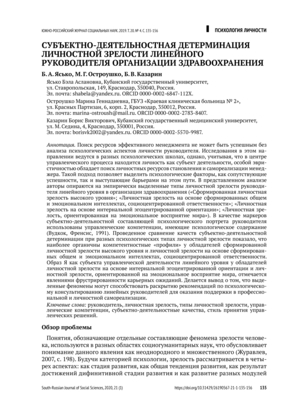Abstract
The search for effective management resources cannot be successful without analyzing the psychological aspects of the leader’s personality. Research in this direction is carried out in different psychological schools. Considering that at the center of the management process is a person as a subject of activity, the search for personal resources of the formation and self-realization of a manager is particularly heuristic. This approach allows to highlight psychological factors, both concomitant with success, and acting as "barriers" on this path. In their analysis, the authors rely on empirically distinguished types of personality maturity of the head of the “linear” level in healthcare organization (“High Level Formed Personal Maturity”; “Personal maturity based on the formed general and emotional intelligence, sociocentric responsibility”; “Personal maturity based on internal ego-centered orientation”;“ Personal maturity focused on the emotional perception of the world”). As subject-activity markers of the psychological “portrait” of the head, managerial competencies with psychological content were used (Woodcock, Francis, 1991). The comparison of the qualities of subjective-active determination with different psychological types of personality maturity showed that the most organic are the competency “profiles” among holders of high-level formed personality maturity and personality maturity based on the formed general and emotional intellects, sociocentric responsibility. The image of the Self as a subject of managerial activity of a “linear” level among holders of personality maturity on the basis of internal ego-centered orientation and personality maturity, focused on the emotional perception of the world, is marked by frustration of career expectations. It is concluded that the identified phenomena can contribute to the disclosure of meaningful recommendations for psychological counseling of “linear” managers to support professional and personal self-realization.
Keywords
References
Базаров, Т.Ю. (2006). Управление персоналом: учеб. пособие. М.: ИЦ «Академия».
Вудкок, М., Френсис, Д. (1991). Раскрепощенный менеджер. М.: Дело.
Журавлев, А.Л. (2004). Психология управленческого взаимодействия (теоретические и прикладные аспекты). М.: Изд-во «Институт психологии РАН».
Журавлев, А.Л. (2007). «Социально-психологическая зрелость»: попытка обосновать понятие. В А.Л. Журавлев, Е.А. Сергиенко (ред.) Феномен и категория зрелости в психологии (с. 198–222). М.: Изд-во «Институт психологии РАН».
Занковский, А.Н. (2011). Психология лидерства: от поведенческой модели к культурно-ценностной парадигме. М.: Изд-во «Институт психологии РАН».
Занковский, А.Н. (2015). Психология организационного лидерства: в поисках корпоративной синергии. М.: Изд-во Литера.
Карпов, А.В. (2004). Психология рефлексивных механизмов деятельности. М.: Изд-во «Институт психологии РАН».
Карпов, А.В., Маркова, Е.В. (2003). Психология стилей управленческих решений. Ярославль: Институт «Открытое общество».
Морозова, Г.Б. (2006). Психологическое сопровождение организации и персонала. СПб.: Речь.
Приказ Министерства труда и социальной защиты РФ от 7 ноября 2017 г. № 768н “Об утверждении профессионального стандарта “Специалист в области организации здравоохранения и общественного здоровья”. Режим доступа https://www.garant.ru/products/ipo/prime/doc/71722794/
Прядеин, В.П. (2014). Психодиагностика личности. Избранные психологические тесты: Практикум. Сургут: Сургутский гос. пед. ун-т.
Пыжова, Н.Н. (2017). Локус контроля и интеллект руководителя как показатели личностной зрелости. Научные труды Республиканского института высшей школы, 17(3), 309–316.
Смельцова, А.С., Щукина, М.А. (2018). «Личностная зрелость руководителя»: разработка и первичная психометрическая проверка опросника. Вестник Вятского государственного университета, 2, 102–112.
Журавлев, А.Л., Сергиенко, Е.А. (ред.) (2007). Феномен и категория зрелости в психологии. М.: Изд-во «Институт психологии РАН».
Эриксон, Э. (1996). Идентичность: юность и кризис. М.: «Прогресс».
Greenberger, E., Steinberg, L. (1986). When Teenagers Work. The Psychological and Social Costs of Adolescent Employment. New York: Basic Books.
Inkeles, A., Leidermn, H. (1998). An Approach to the Study of Psychosocial Maturity. International Journal of Comparative Sociology, 39(1), 52–76.
Kohlberg, L. (1981). Essays in Moral Development. Vol. I: The Philosophy of Moral Development. New York: Harper & Row.
Kohlberg, L. (1984). Essays in Moral Development. Vol. II: The Psychology of Moral Development. New York: Harper & Row.
Kohlberg, L., Levine, Ch., Hewer, A. (1983). Moral Stages: a Сurrent Formulation and Response to Critics. New York: Karger.
Loevinger, J. (1993). Ego Development: Question of Method and Theory. Рsychological Inquiry, 4(1), 56–63.
Loevinger, J. (1994). In Search of Grand Theory. Psychological Inquiry, 5(2), 142–144.
Loevinger, J. (1997). Stages of Personality Development. In R. Hogan, J. Johnson & S. Briggs (Eds.). Handbook of Personality Psychology. San Diego: Academic Press.
Marcia, J. (1980). Identity in Adolescence. In J. Adelson (Ed.) Handbook of Adolescence Psychology. New York: Wiley.
Mead, G.H. (1980). The Philosophy of the Present. Chicago and London: University of Chicago Press.
Oyserman, D. (2003). Self-Concept and Identity. In A. Tesser, N. Schwarz The Blackwell Handbook of Social Psychology. Intraindividual Processes (pp. 499–517). London: Blackwell Publishings.
Selman, R.L. (1980). The Growth of Interpersonal Understanding. New York: Academic Press.


